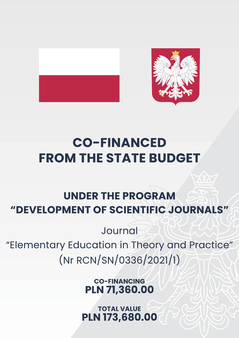Implementation of the Model of Educating Pre-School and Early School Teachers in Poland
Abstract
The reform of higher education in Poland changes the system and standards of educating pre-school and early school teachers. Since the publication, in 2019, of the “Regulation of the Minister of Science and Higher Education on the standard of education preparing for the teaching profession” (Journal of Laws 2019, item 1450), changes have been introduced, which include the transfer of the teacher education process from a two-stage system to the system of uniform studies ending with a master’s degree. Changes in the teacher training were preceded by the development of a specific education model and the implementation of programs under various projects co-financed from European funds. The aim of this article is to present and evaluate the assumptions of the “Proposed model of educating pre-school and early school teachers” (from 2018), based on the example of the implementation of the project entitled “Experimental curriculum for training kindergarten and early school teachers at the Jesuit University Ignatianum in Krakow”, and to indicate significant differences between the initial assumptions, which are currently being implemented as an experiment at several universities, and the ministerial guidelines in force since 2019. After a brief introduction and outline of the current situation, the main reasons for the development of the new guidelines (that were assessed) have been identified. Changes in the teacher education process are to contribute to the improvement of the quality of their preparation, which was taken into account in both of the above-mentioned and analysed documents.
References
Czerepaniak-Walczak M. (1997). Aspekty i źródła profesjonalnej refleksji nauczyciela, Toruń: Wydawnictwo „Edytor”.
Gołębniak, B.G., Krzychała, S. (2015). Akademickie kształcenie nauczycieli w Polsce – raport z badań. „Rocznik Pedagogiczny”, s. 97–112.
Grzeszkiewicz B. (2002), W poszukiwaniu wzoru nauczyciela wychowania przedszkolnego, w: Kompetencje nauczyciela. Stan, potrzeby i kierunki zmian, red. E. Kozioł, E. Kobyłecka, Zielona Góra: Oficyna Wydawnicza UZ.
https://archiwum.ncbr.gov.pl/fileadmin/POWER/03.01...PKN_18/zal._nr_6_Lista_ran- kigowa_pozytywna_PKN.pdf [dostęp: 12.02.2021].
https://www.gov.pl/web/edukacja-i-nauka/konkurs-ncbr-na-programy-ksztalcenia-nauczycieli [dostęp: 12.02.2021].
https://www.gov.pl/web/edukacja-i-nauka/opracowanie-modelowych-programow-ksztalcenia-nauczycieli-w-ramach-dzialania-31-kompetencje-w-szkolnictwie-wyzszym, [do- stęp: 12.02.2021].
Karbowniczek J., Kwaśniewska M., Surma B., Podstawy pedagogiki przedszkolnej z metodyką. Kraków: Wydawnictwo Ignatianum.
Pawelec L. (2017). Jakość przygotowania zawodowego nauczycieli w świetle badań empirycznych, „Annales Universitatis Mariae Curie-Skłodowska Lublin – Polonia”, vol. XXX, nr 2, s. 99–114, DOI: 10.17951/j.2017.30.2.99
Rozporządzenie Ministra Nauki i Szkolnictwa Wyższego w sprawie standardu kształcenia przygotowującego do wykonywania zawodu nauczyciela” (Dz.U. 2019 poz. 1450) http://isap.sejm.gov.pl/isap.nsf/DocDetails.xsp?id=WDU20190001450 [dostęp: 12.02.2021].
Rozporządzenie Ministra Nauki i Szkolnictwa Wyższego w sprawie standardu kształcenia przygotowującego do wykonywania zawodu nauczyciela” (Dz.U. 2012 poz. 131) https:// www.bip.nauka.gov.pl/g2/oryginal/2013_05/c49a61a9a3861e7a323901ff0849dff3. pdf [dostęp: 12.02.2021].
Surma B. (2011). Uczestnicy (podmioty) procesu edukacyjnego w przedszkolu, w: Karbowniczek J., Kwaśniewska M., Surma B., Podstawy pedagogiki przedszkolnej z metodyką. Kraków: Wydawnictwo Ignatianum, s. 158–172.
Surma B. (2019). Kształtowanie kluczowych kompetencji nauczycieli edukacji elementarnej – raport z badań. „Edukacja Elementarna w Teorii i Praktyce”, 14(52), s. 93–104. https://doi.org/10.35765/eetp.2019.1452.06.
Copyright (c) 2021 Elementary Education in Theory and Practice

This work is licensed under a Creative Commons Attribution-NoDerivatives 4.0 International License.
- When submitting a text, the author declares that he/she is the Author of the article (hereinafter referred to as the “Work”) and:
- he/she owns the exclusive and unlimited copyright to the Work,
- is entitled to dispose of the copyright to the Work.
Declares that it does not infringe any third party copyrights or legal rights.
Declares that there is no conflict of interest.
2. At the same time, the Author grants the Ignatianum University in Cracowa royalty-free, non-exclusive and territorially unlimited licence to use the Work in the following fields of exploitation:
- recording the Work in a hard copy, as well as on a digital or magnetic medium;
- reproduction of the Work using any technique, without limitation of the number of editions or copies;
- distribution of the Work and its copies on any medium, including marketing, sale, lending, and rental;
- introduction of the Work into a computer memory;
- disseminating the Work in information networks, including in the Internet;
- public performance, exhibition, display, reproduction, broadcasting and re-broadcasting, as well as making the Work available to the public in such a way that everyone can have access to it at a time and place of their own choosing;
- within the scope of dependent rights to the Work, including in particular the right to make necessary changes to the Work resulting from editorial and methodical development, as well as to translate the Work into foreign languages;
The licence is granted from the moment of the transfer of the Work to the Ignatianum University in Cracow. The Ignatianum University in Cracow is entitled to grant further sub-licences to the Work within the scope of the right granted. The licence is time-limited and it is granted for a period of 15 years, starting from the date of its granting.
Authors are permitted and encouraged to publish their text online (e.g. in their institution’s repository or on the institution’s website) before or during the submission process as this may lead to beneficial exchanges, as well as earlier and greater citation of the published text (See The Effect of Open Access). We recommend using any of the following portals of research associations:
- ResearchGate
- SSRN
- Academia.edu
- Selected Works
- Academic Search





